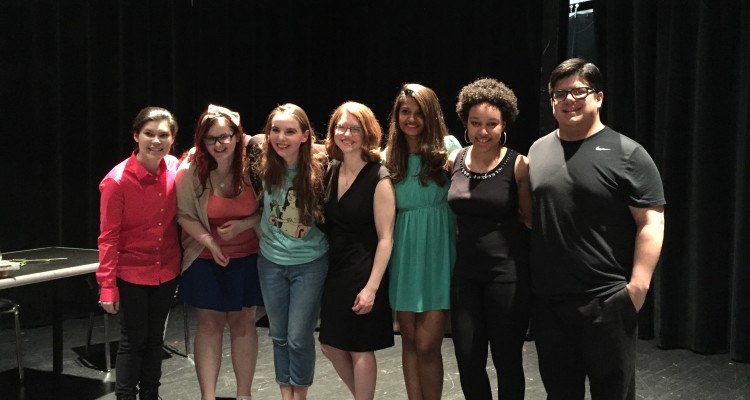Having the right amount of confidence to convey a story with a special message takes a talented and passionate group of people, and Fairfield’s Performing for Change group certainly achieved this goal through their performance, “What Feminism Looks Like.” Performing for Change is a group on campus that is dedicated to speaking out against social injustices. PFC showcased “What Feminism Looks Like” on March 31 in the Wein Black Box Theater. The performance truly encompassed the idea of what it means to be feminist.
There is something powerful in the way that both their spoken word and non-verbal communication resonated within the minds of audience members. The performance demonstrated certain moments of a long monologue that captivated the audience through rhythmic and soulful expression emitted by the actors, in addition to silent moments where body language was enough to bring people to tears. This powerful performance successfully used everyday, relatable scenarios to demonstrate why there is a need for feminism within society.
PFC decided to use five main characters to best showcase their beliefs. Senior Sandanie Ambalangodage played the role of Dr. Angela Mason, the therapist to Trina (Kaadiana Barnes ‘17), Corey (Katie Barrera ‘18), Devon (Meagan Hamilton ’17) and Bethany (Erin Nordgren ‘19).
Angela grew up in a family where the mother/wife is known for taking care of the family. Thus, Angela’s father expects her to grow up similarly: marrying early, having children, cooking and cleaning. However, Angela expresses her desire to be independent and successful with her career. By the end of the performance, Angela convinces her father that men are not the only ones who are able to be self-sufficient. This particular part of the performance really resonated with audience members; particularly one member who spoke about her life in her home country. The audience member explained how she used to be expected to marry young and take care of the home and of the children, but believes that women have the strength and power to do more than that. The performance brought this audience member to tears as she was able to connect and relate to Angela’s character and how they both aspired to be independent and successful in their careers.
Devon, a character who believes that she is not taken seriously by her male co-workers, feels the need to dress conservatively in order to be respected. By the end of the performance, Devon realizes that she shouldn’t be nervous about how her appearance will affect her success and decides to start wearing outfits that she feels comfortable and confident in.
Corey, a non-binary character uses they/them pronouns, struggles with familial acceptance and also with societal discrimination against transgender and other non-binary minorities. Additionally, Corey undergoes conflict with their girlfriend, Trina, who doesn’t understand why Corey has to go to therapy and claims that they are “wasting their money.”
Finally, Bethany’s character is recovering from sexual assault. Bethany blames herself for the encounter, but later realizes that it is not her fault and seeks the comfort and support of her new boyfriend.
“What Feminism Looks Like” addressed various aspects of feminism, and thus captured the hearts of many audience members who were able to relate to one or more of the characters. Although not all members of the performance have acting experience, the group was able to hold the attention of the audience and develop an emotional reaction, something that even professional actors work hard to achieve.
“The acting is great because of their portrayal of different scenarios regarding feminism,” said Catherine Pezzella ‘17. “Feminism has multiple sides to it and despite what people believe, feminism is not man-hating.”
March is nationally known as women’s history month. By putting on their performance at the end of the month, PFC provided an inspirational end to the celebration of women’s rights.
However, it was observed that the performance attracted audience members who identify as feminists. It would have been even more impactful had the show been viewed by a politically diverse group of people. But as feminist audience member Kelly Villacres ‘17 explains, they cannot force people to attend the performance.
“A lot of students would benefit from coming to the performance,” said Villacres. “I’ve been coming since my freshman year and I often wonder why this show can’t be held in the auditorium of the Quick Center to attract a larger audience and inform people who don’t know much about feminism, so that they will be able to be exposed to more than just the negative connotation that feminism carries.”
For the few audience members who did attend the performance with minimal knowledge about what it really means to be a feminist, they claimed that PFC was inspiring and helped them to better understand what it means to identify as a feminist.
Junior Jasmine Raghunandan stated, “I think everyone should come out to see this because it is very educational. I thought they touched upon a lot of perpetuated stereotypes that should not be applicable to modern day society. It seems to me that feminism is more than just being about strong and secure, it’s about standing up for what you believe in. The idea that feminism is about breaking older, negative stereotypes was definitely portrayed through the show.”
PFC took the audience on a journey through the eyes of a modern day woman and showcased that people who believe in the negative societal stereotypes of feminists are uneducated about what it means to stand up for the rights of women, PFC appeared professional, knowledgeable and passionate about what they believe and were flawlessly successful in conveying their influential message.
If anyone has any questions regarding the PFC group on campus, they could contact kaadiana.barnes@student.fairfield.edu or sandanie.ambalangodage@student.fairfield.edu for more information.


Leave a Reply